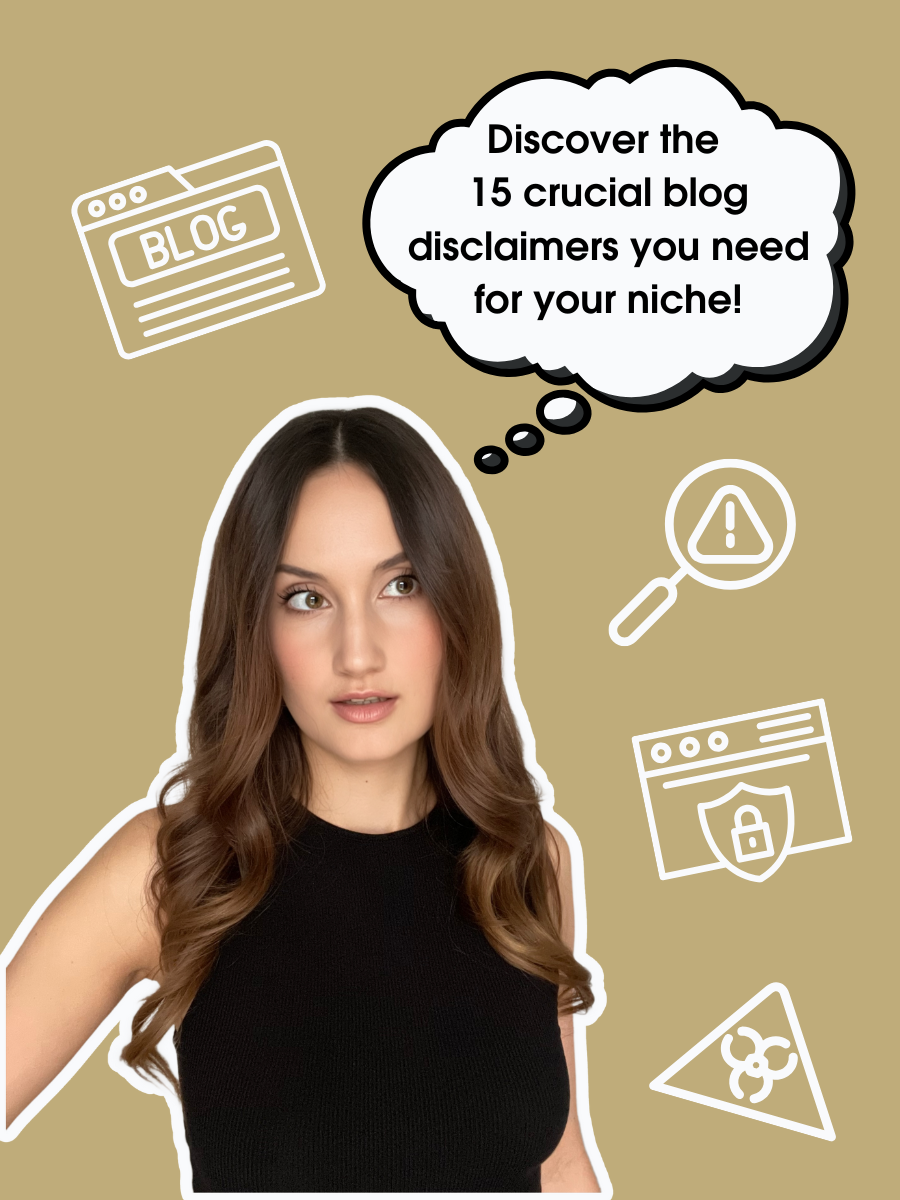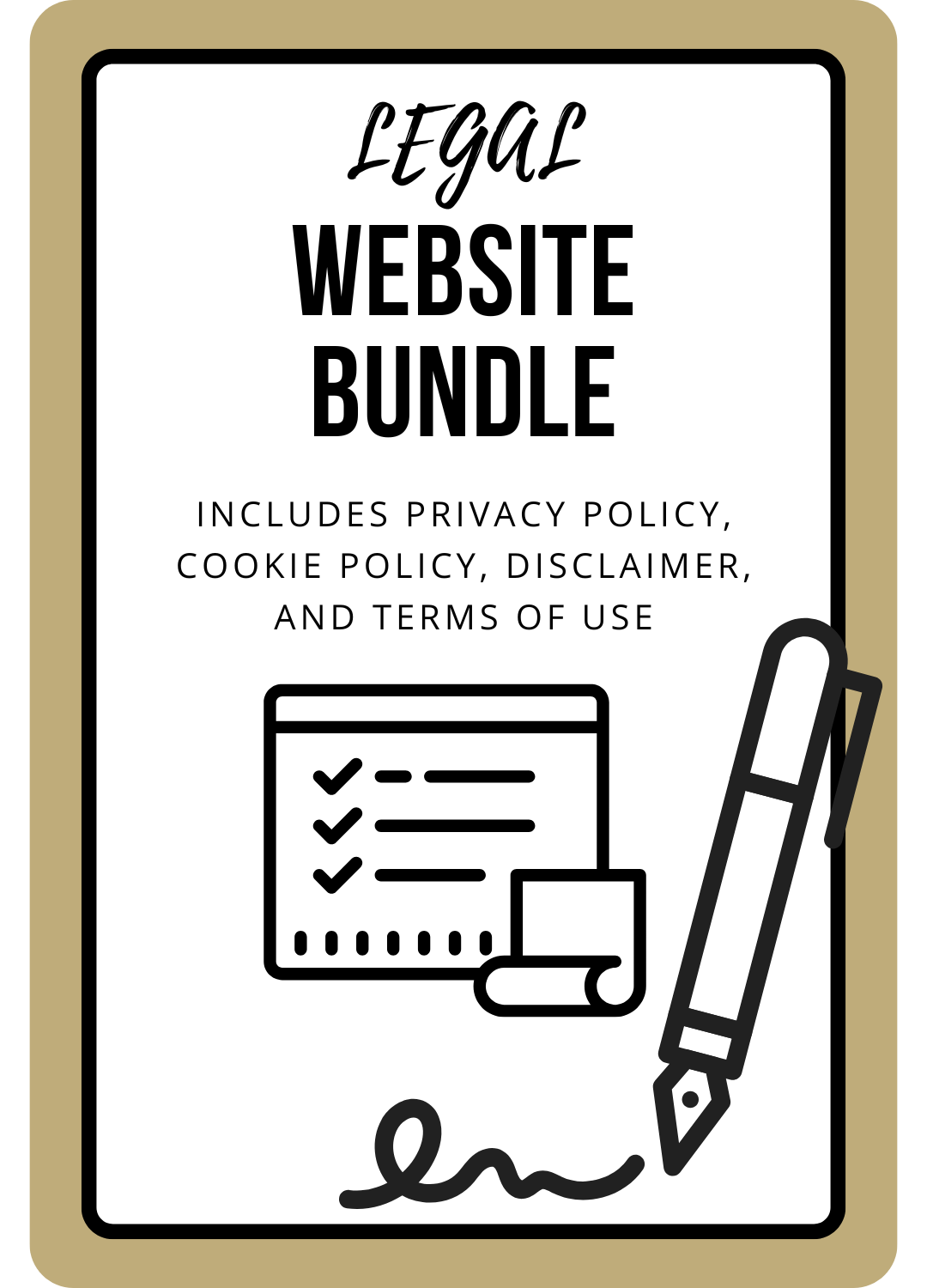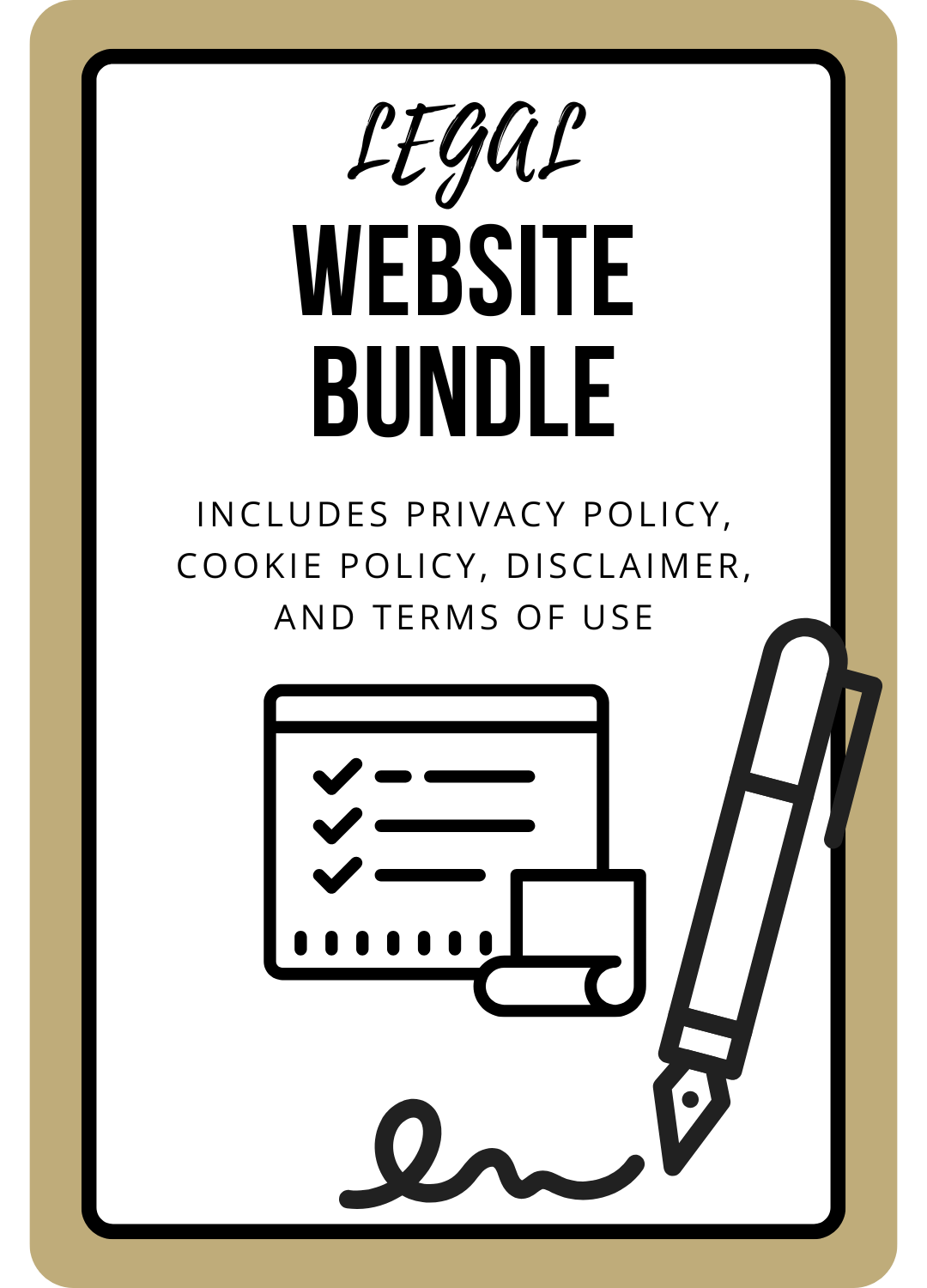15 Niche-Specific Blog Disclaimers Every Blogger Needs to Stay Safe, Credible & Compliant
Searching for blog disclaimers and not sure which ones you actually need?
Whether you share recipes, business tips, or mental health advice, the wrong wording (or missing niche-specific disclaimers) can leave you legally exposed — and damage your credibility.
As a lawyer who helps creators and bloggers like you every day, I’ve seen the same issues over and over: blog disclaimers that are too short, too generic, or completely mismatched to the blog’s niche. That’s why this post breaks down 15 niche-specific blog disclaimers — from affiliate disclosures to professional and personal blog disclaimers — that every blogger needs to stay safe, credible, and compliant.
By the end, you’ll know exactly which blog disclaimers apply to your blog and what your disclaimer statement must include to protect your content, income, and reputation.
Protect your blog from legal risks — get the full, lawyer-drafted Disclaimer Statement Template inside the Legal Website Bundle.
This post is all about the 15 niche-specific blog disclaimers you actually need to protect your blog, income, and reputation.
Best Blog Disclaimers
The Complete List of the 15 Best Blog Disclaimers
1. Errors & Accuracy Disclaimer — Because Mistakes Happen
Even the most careful bloggers make typos, cite outdated statistics, or misinterpret studies. One small error can spark angry comments or — worse — a claim that you “misled” readers.
⚠️ Here’s what could go wrong without a proper errors & accuracy disclaimer statement:
A reader acts on an outdated tutorial and blames you for their loss.
You update a post but forget to change an old claim — and someone takes a screenshot of it.
A broken link or missing citation is treated as “false information.”
🧾 Here’s what your errors & accuracy disclaimer statement must include:
Informational-only purpose: Make it clear your content is for general information, not guaranteed facts.
No guarantee of accuracy or completeness: You don’t promise every post is perfect, current, or exhaustive.
No liability for reliance: Readers use your content at their own risk.
Right to update or change content: You can edit or remove posts without notice.
These four blog disclaimers instantly shift responsibility from you to the reader — while keeping your blog professional and trustworthy.
👉 Already built into the Disclaimer Statement Template inside the Legal Website Bundle.
2. No (Professional) Advice Disclaimer — You’re Not Their Advisor
If you share any tips, insights, or personal experiences, a reader could take them as professional guidance. If they act on your content and things go wrong, you could be accused of giving bad or unqualified professional advice.
⚠️ Here’s what could go wrong without a proper no-advice disclaimer statement:
A reader follows your productivity or financial tips, loses money, and blames you for it.
You mention a skincare routine, and someone claims an allergic reaction.
You share your personal diet, and a reader treats it like medical advice.
🧾 Here are a few short blog disclaimers your no-advice disclaimer statement should include:
General information only: Clearly state that your content is for informational and educational purposes.
Not professional advice: Specify that it doesn’t replace expert guidance in legal, financial, medical, or other fields.
Reader responsibility: Emphasize that readers act on your content at their own risk and discretion.
Encouragement to seek experts: Suggest consulting a qualified professional before taking action.
These blog disclaimers make it clear your content informs — it doesn’t instruct.
👉 Already pre-written in the Disclaimer Statement Template inside the Legal Website Bundle — so you’re protected from liability when readers misunderstand your role.
3. No Professional-Client Relationship — You’re Not Their Consultant
Many bloggers are also professionals, such as consultants, accountants, or lawyers, who share their expertise online. The problem? Readers may mistake your content (or even a digital product purchase) for the beginning of a professional relationship. Without ironclad blog disclaimers, that misunderstanding could turn into a liability claim.
⚠️ Here’s what could go wrong without a proper professional-client relationship disclaimer statement:
A reader treats your blog as a private consultation and expects personalized advice.
Someone purchases your eBook or course and assumes you’re now “their coach” or “their lawyer.”
A reader shares personal information in a comment and later claims confidentiality was implied.
🧾 Here are the blog disclaimers your professional-client relationship disclaimer statement should include:
No professional relationship formed: make it clear that reading your blog or buying your products doesn’t create a professional relationship.
Requires written agreement: specify that a professional relationship only exists after signing a written contract for paid services.
No confidentiality: Remind readers that shared information isn’t confidential unless agreed upon separately.
Applies to all readers: Clarify that this applies even if you’re licensed or certified in a particular field.
These blog disclaimers protect professionals who blog — and keep personal or educational content clearly separate from paid client work.
👉 These customizable blog disclaimers are included in the Disclaimer Statement Template inside the Legal Website Bundle — simply customize them to your profession.
4. Third-Party Information Disclaimer — Protect Against Guest Content Risks
If your blog includes guest posts, quotes, or external links — and that content is inaccurate, offensive, or misleading, you could be blamed unless you’ve clearly disclaimed responsibility for their stuff.
⚠️ Here’s what could go wrong without a proper third-party information disclaimer statement:
A guest writer shares incorrect information, and a reader calls you out for false information.
You link to an article that later gets taken down or contains controversial claims.
A third-party resource you mentioned updates its products or services, and readers hold you accountable for outdated info.
🧾 Here are the blog disclaimers your third-party information disclaimer statement should include:
No control over third-party content: Clarify that you don’t own or manage linked websites or guest posts.
No responsibility for accuracy: State you’re not liable for any errors, omissions, or changes in third-party information.
Reader assumes risk: Emphasize that visiting external links or using third-party resources is entirely at the reader’s discretion.
Independent relationship: Clarify that any transaction between a reader and a third party is solely between them.
These blog disclaimers ensure you’re not held accountable for something you didn’t write, say, or endorse — a must for bloggers who collaborate, quote experts, or share resources.
👉 Already built into the Disclaimer Statement Template inside the Legal Website Bundle — so you’re protected even when others contribute to your blog.
5. Affiliate Link Disclosure & Disclaimer — Stay Transparent (and FTC-Compliant)
If you earn commissions through affiliate links or product referrals, you’re legally required to disclose those relationships. And beyond compliance, transparency builds trust — and prevents readers from thinking your recommendations are biased or deceptive.
⚠️ Here’s what could go wrong without a proper affiliate link disclosure and disclaimer statement:
The FTC fines you for failing to disclose paid relationships.
A reader accuses you of “hidden advertising” or false recommendations.
A brand ends your partnership because you didn’t meet their disclosure standards.
That’s why you need affiliate disclosures included in your disclaimer statement, letting readers know you may earn commissions when they click or buy.
It not only keeps you compliant with FTC guidelines but also reinforces your credibility — showing readers that they can trust your honesty and ethics.
And don’t just include the disclosure in your disclaimer statement, make sure you include a short affiliate disclosure near the beginning of posts (and not buried at the bottom).
👉 Already built into the Disclaimer Statement Template inside the Legal Website Bundle — PLUS it includes a pre-written affiliate disclosure statement you can include at the beginning of your blog posts!
6. Sponsored Content Disclaimer — Keep Paid Posts Honest
When brands pay you to feature or review their products (or give you products in exchange for posts), you’re legally required to give full transparency.
PLUS, you must clearly state when a post or product mention is paid or sponsored within the post itself.
You should also include the following blog disclaimers for sponsored posts:
Reader responsibility: remind readers to do their own research before purchasing.
No guarantees or promises: specify that your results or experiences may not reflect others’.
These disclaimers show transparency and preserve audience trust, while remaining compliant with advertising standards — especially if you regularly collaborate with brands or feature sponsored products.
👉 Already built into the Disclaimer Statement Template inside the Legal Website Bundle — PLUS it includes pre-written sponsorship disclosures for blog posts, but also social media posts, YouTube videos, and podcasts!
7. Financial, Tax & Legal Disclaimers — For Business & Money Blogs
If you share money tips, budgeting advice, or anything that sounds remotely like financial or legal guidance, these blog disclaimers are essential. Even a casual “how to save on taxes” or “how to structure your business” post can trigger liability if readers rely on your content and lose money.
⚠️ Here’s what could go wrong without proper financial, tax & legal blog disclaimers:
A reader follows your budgeting advice, gets hit with unexpected tax penalties, and blames you.
You explain how you structured your LLC, and someone copies it — then faces legal issues.
A reader misinterprets your content as professional advice and claims you caused them financial loss.
🧾 Here are the blog disclaimers your disclaimer statement should include:
No financial, tax, or legal advice: Make it clear your content isn’t professional advice.
No guarantee of results: Clarify that earnings, outcomes, or business success aren’t promised.
Compliance responsibility: Emphasize that readers are responsible for following applicable laws and regulations.
Educational purpose only: Remind readers that your content is for general informational and educational use.
These blog disclaimers protect bloggers in the business, finance, and entrepreneurship space from being held accountable for how readers interpret or act on their content.
👉 Already pre-written as optional blog disclaimers in the customizable Disclaimer Statement Template inside the Legal Website Bundle.
8. Medical, Fitness & Health Disclaimers — For Health & Wellness Blogs
If your blog covers workouts, nutrition, or wellness routines, you’re dealing with content that can directly affect readers’ health. Without clear blog disclaimers for these niches, you could be blamed for injuries, allergic reactions, or medical complications that occur when someone follows your advice.
⚠️ Here’s what could go wrong without proper medical, fitness & health blog disclaimers:
A reader follows your workout routine, gets injured, and claims you caused it.
Someone tries a recipe you shared and blames you for an adverse reaction.
You discuss supplements or diets, and a reader experiences side effects or health complications.
🧾 Here are the blog disclaimers your disclaimer statement should include:
No medical or health advice: clarify that your content doesn’t replace medical or professional healthcare guidance.
No diagnosis or treatment: state that your posts don’t diagnose, treat, prevent, or cure any condition.
Consult professionals: encourage readers to seek advice from a qualified healthcare provider before making changes.
No liability for outcomes: disclaim responsibility for injuries, health issues, or adverse reactions.
These blog disclaimers are crucial for any fitness, nutrition, or wellness blogger — even if you’re just sharing your own experiences.
👉 Already included as optional blog disclaimers in the Disclaimer Statement Template inside the Legal Website Bundle— ready to tailor for your niche.
Blogging about health, money, or sponsored content?
Then a generic disclaimer statement won’t protect you.
Each niche has unique risks — from affiliate income disclosures to fitness disclaimers and legal disclaimers for business advice.
But you don’t need to write them from scratch!
🧾 The Legal Website Bundle already includes:
A customizable Disclaimer Statement Template with all 15 niche-specific blog disclaimers
A Privacy Policy Template to meet GDPR & global privacy standards
Website Terms of Use to define how visitors can use your content
Everything is lawyer-drafted, editable, and designed to keep your blog safe, credible, and compliant — no legal jargon required.
👉 Get the Legal Website Bundle, so your blog is fully protected with a terms of use template, blog disclaimer and privacy policy!
9. Mental Health Disclaimer — For Mindset & Self-Help Blogs
If you write about mindset, motivation, or emotional well-being, you’re walking a fine line between inspiration and what could be interpreted as mental health advice or even therapy. Without a clear mental health disclaimer, readers might assume your content replaces professional counseling or psychological care.
🧾 Here are the blog disclaimers your disclaimer statement should include:
No substitute for therapy or counseling: Clarify that your content isn’t a replacement for professional mental health care.
No diagnosis or treatment: State that your posts don’t diagnose or treat any psychological or medical condition.
Encourage professional support: Advise readers to seek the services of licensed therapists, counselors, or healthcare providers for personal issues.
Disclaim emotional liability: Specify that you’re not responsible for readers’ emotional responses or outcomes.
These blog disclaimers are essential for self-help and personal development bloggers — they enable you to share support and encouragement without assuming professional responsibility.
👉 Already built into the Disclaimer Statement Template inside the Legal Website Bundle as optional blog disclaimers customizable to your niche.
10. Vitamins & Supplements Disclaimers — For Wellness or CBD Blogs
If you mention vitamins, supplements, herbal remedies, or alternative health products (including CBD oil), these blog disclaimers are non-negotiable.
⚠️ Here’s what could go wrong without proper vitamins & supplements blog disclaimers:
A reader takes a supplement you mentioned, experiences adverse side effects, and holds you responsible.
Someone mixes products unsafely after following your wellness routine.
A reader assumes your blog “recommends” or “endorses” a supplement you only mentioned in passing.
🧾 Here are the blog disclaimers your disclaimer statement should include:
No guarantee of safety or effectiveness: Clarify that you don’t promise results or benefits from any supplement or product.
Not evaluated by authorities: State that product information hasn’t been reviewed or approved by any governmental or medical body.
Consult a healthcare professional: Advise readers to talk to a licensed professional before using any supplements or products.
No endorsement: Make it clear that product mentions are informational — not recommendations or approvals.
These blog disclaimers protect you from liability when discussing anything that affects readers’ health, especially in the wellness, nutrition, and alternative medicine spaces.
👉 Already included as optional vitamins and supplements disclaimers in the Disclaimer Statement Template inside the Legal Website Bundle.
11. Recipes Disclaimer — For Food Bloggers
If you share recipes, meal ideas, or ingredient swaps, these blog disclaimers are a must. Even simple cooking content can cause issues if a reader experiences an allergic reaction, mishandles ingredients, or misinterprets your instructions.
🧾 Here are the blog disclaimers your disclaimer statement should include:
Informational purposes only: clarify that recipes are based on personal experience, not professional dietary advice.
No liability for outcomes: specify that you’re not responsible for results, reactions, or allergic responses.
Read product labels: remind readers to always check packaging and manufacturer instructions.
Dietary responsibility: emphasize that readers are responsible for knowing their allergies and restrictions.
These blog disclaimers protect food bloggers from the endless “but your recipe made me sick” claims — while maintaining transparency and professionalism.
👉 Already pre-written as optional recipes disclaimers in the Disclaimer Statement Template inside the Legal Website Bundle — just plug them in for your food blog.
12. DIY Projects Disclaimer — For Craft or Home Improvement Blogs
DIY content might seem harmless — until someone injures themselves following your tutorial or damages their home trying to “do it themselves.” Without clear DIY disclaimers, readers can hold you responsible for accidents, property damage, or failed projects.
⚠️ Here’s what could go wrong without proper DIY blog disclaimers:
A reader burns themselves using a hot glue gun or power tool featured in your post.
Someone follows your painting guide, damages their furniture, and demands reimbursement.
A reader ignores safety warnings, injures themselves, and claims your tutorial didn’t include enough precautions.
🧾 Here are the blog disclaimers your disclaimer statement should include:
DIY at your own risk: make it clear readers are responsible for their own safety and results.
No guarantee of safety or success: Clarify that you can’t guarantee the outcome or safety of any project.
Follow manufacturer instructions: Advise readers to read and follow product labels, manuals, and safety guidelines.
No liability for injuries or damages: Disclaim responsibility for accidents, injuries, or property damage.
These blog disclaimers keep creative, craft, and home improvement bloggers protected when readers attempt projects without proper tools, materials, or experience.
👉 Already included as optional DIY project disclaimers in the Disclaimer Statement Template inside the Legal Website Bundle — ready to tailor for your niche tutorials.
13. No Influencing Disclaimer — For Lifestyle & Opinion Blogs
If your blog includes any personal opinions, lifestyle tips, or reflections on values and beliefs, readers might think that:
You’re trying to persuade or influence their decisions.
Your opinion post or advice “pressured” them into a decision.
You’re promoting a political, spiritual, or ideological agenda.
🧾 Here are the blog disclaimers your disclaimer statement should include:
No intent to influence or persuade: Clarify that your content is meant to inform and inspire — not convince or impose.
Reader autonomy: Emphasize that readers make their own choices and interpretations.
No responsibility for decisions: Specify that you’re not liable for readers’ actions or changes in beliefs.
Respect for differing views: Note that opinions shared reflect personal experiences, not universal truths.
These blog disclaimers protect you from misunderstandings when sharing opinion-based, spiritual, or values-driven content — and help keep your blog’s tone open, respectful, and transparent.
👉 Already pre-written as optional no-influencing disclaimers in the Disclaimer Statement Template inside the Legal Website Bundle — perfect for lifestyle, opinion, and personal development blogs.
14. Views, Opinions & Controversial Topics Disclaimers — For Sensitive Subjects
If you publish posts that touch on politics, religion, social issues, or any potentially sensitive or controversial topic, these blog disclaimers are essential. It helps readers understand that your content reflects personal viewpoints — not absolute facts — and protects you from backlash or claims of misrepresentation.
⚠️ Here’s what could go wrong:
A reader misinterprets your opinion as fact and accuses you of spreading misinformation.
Someone takes offense to a controversial statement and launches a public complaint.
A third party claims your post damaged their reputation or portrayed them unfairly.
🧾 Here are the blog disclaimers your disclaimer statement should include:
Opinions, not facts: clarify that all views expressed are personal and subjective.
No representation or endorsement: specify that third-party opinions don’t reflect your views — and vice versa.
Sensitive content warning: inform readers that topics may include controversial or emotionally charged material.
No liability for reactions: disclaim responsibility if readers are offended, distressed, or disagree with your opinions.
These blog disclaimers protect your freedom of expression while making it clear you’re not accountable for how others perceive or react to your views.
👉 Already included as optional views and opinions disclaimers in the Disclaimer Statement Template inside the Legal Website Bundle — ideal for blogs that tackle sensitive or controversial subjects.
15. Testimonials & Earnings Disclaimers — For Business, Coaching & Course Blogs
If your blog features testimonials, client results, or income claims, you need this disclaimer. Without it, readers could assume they’ll achieve the same success — and accuse you of misleading or deceptive marketing if they don’t.
⚠️ Here’s what could go wrong without proper testimonials & earnings blog disclaimers:
A reader sees a success story, buys your course, and complains when they don’t get the same results.
Someone claims your testimonial was “false advertising” or an unrealistic promise.
A regulator or platform flags your content for unverified income claims.
🧾 Here are the blog disclaimers your disclaimer statement should include:
Results vary: clarify that testimonials are personal experiences, not guaranteed outcomes.
No promises or warranties: specify that success depends on each person’s own effort, skills, and circumstances.
Informational purposes only: state that testimonials and examples are for education and illustration, not performance guarantees.
Encourage independent research: remind readers to do their own due diligence before purchasing or acting.
These blog disclaimers protect your credibility and ensure transparency — especially if your blog promotes programs, digital products, or coaching services.
👉 Already pre-written as optional testimonials and earnings disclaimers in the Disclaimer Statement Template inside the Legal Website Bundle — customize them for your offers in minutes.
The ULTIMATE Disclaimer Statement for Your Blog
Every blog — no matter the niche — carries legal risks. From affiliate links to health tips, one missing disclaimer could expose you to complaints, refund demands, or even legal claims.
The good news? You can cover yourself in minutes with the Legal Website Bundle — no lawyer fees, no confusing legalese.
🧾 Here’s what’s inside:
A lawyer-drafted Disclaimer Statement Template with all 15 niche-specific blog disclaimers
A Privacy Policy Template that’s GDPR-ready and globally compliant
Website Terms of Use that protect your content and define how visitors can use it
Don’t wait until someone calls you out for missing disclaimers — protect your blog, your income, and your reputation today.
🛡️ Grab the Legal Website Bundle and make your blog safe, credible, and compliant before your next post goes live.
This post was all about the 15 niche-specific blog disclaimers you actually need to protect your blog, income, and reputation.
Other posts you may like:








